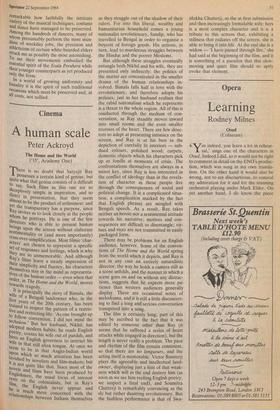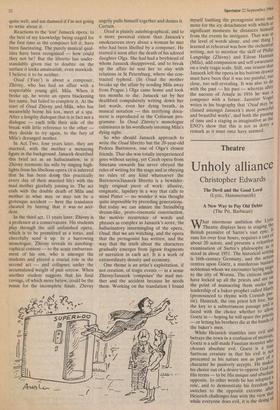Opera
Learning
Rodney Milnes
Osud (Coliseum)
-Ves indeed, you learn a lot in rehear- ". sal,' sings one of the characters in Osud. Indeed I did, so it would not be right to comment in detail on the ENO's produc- tion, which was sung in my own transla- tion. On the other hand it would also be wrong, not to say discourteous, to conceal my admiration for it and for the stunning orchestral playing under Mark Elder. On yet another hand, I do know the piece
quite well, and am damned if I'm not going to write about it.
Reactions to the 'lost' Janacek opera, to the best of my knowledge being staged for the first time as the composer left it, have been fascinating. The purely musical qual- ities have been recognised — how could they not be? But the libretto has under- standably given rise to doubts: on the surface it looks amateurish, even mawkish. I believe it to be neither.
Osud ('Fate') is about a composer, Zhivny, who has had an affair with a respectable young girl, Mila. When it broke up, he wrote an opera blackening her name, but failed to complete it. At the start of Osud Zhivny and Mila, who has meanwhile borne his son, meet at a spa. After a lengthy dialogue that is in fact not a dialogue — each tells their side of the break with little reference to the other they decide to try again, to the fury of Mila's deranged mother.
In Act .Two, four years later, they are married, with the mother a menacing figure in the background. Janacek described this brief act as an hallucination; in it Zhivny torments his wife by singing high- lights from his libellous opera (it is inferred that he has been doing this practically every day of their married life) with the mad mother gleefully joining in. The act ends with the double death of Mila and mother in what may or may not be a grotesque accident — here the translator cheated by hinting that it was no acci- dent.
In the third act, 11 years later, Zhivny is a professor at a conservatoire. His students play through the still unfinished opera, which is to be premiered as a torso, and cheerfully send it up. In a harrowing monologue, Zhivny reveals its autobiog- raphical content — to the acute embarrass- ment of his son, who is amongst the students and played a crucial role in the second act — and collapses under the accumulated weight of past sorrow. When another student suggests that his final ravings, of which more below, could be the music for the incomplete finale, Zhivny angrily pulls himself together and denies it. Curtain.
Osud is plainly autobiographical, and to a more personal extent than Janacek's smokescreen story about a woman he met who had been libelled by a composer. He started it soon after the death of his adored daughter Olga. She had had a boyfriend of whom Janacek disapproved, and to break up the affair he sent her to stay with relations in St Petersburg, where she con- tracted typhoid. (In Osud the mother breaks up the affair by sending Mila away from Prague.) Olga came home and took ten months to die. Janacek sat by her deathbed compulsively writing down her last words, even her dying breath, in musical notation — this terrifying docu- ment is reproduced in the Coliseum pro- gramme. In Osud Zhivny's monologue culminates in his wordlessly intoning Mila's dying sighs.
So who should Janacek approach to write the Osud libretto but the 20-year-old Pedora Bartosova, one of Olga's closest friends. That she was totally inexperienced goes without saying, yet Czech opera from Smetana onwards has never obeyed the rules of writing for the stage and in obeying no rules of any kind whatsoever the Bartosova/Janacek libretto is a bewilder- ingly original piece of work: allusive, enigmatic, lapidary in a way that calls to mind Pinter — no wonder it was thought quite impossible by preceding generations. But today we can admire the Strindberg dream-like, proto-cinematic construction, the motivic recurrence of words and phrases as complex as Janacek's score, the hallucinatory intermingling of the opera, Osud, that we are watching, and the opera that the protagonist has written, and the way that the truth about the characters gradually emerges from jigsaw fragments of narration in each act. It is a work of extraordinary density and economy.
One theme is an artist's exploitation, if not creation, of tragic events — in a sense Zhivny/Janacek 'composes' the mad mo- ther and the accident because he needs them. Working on the translation I found
myself loathing the protagonist more and more for the icy detachment with which at significant moments he distances himself from the events he instigates. That was at the level of words alone, and one thing I learned at rehearsal was how the orchestral writing, not to mention the skill of Philip Langridge (Zhivny) and Eilene Hannan (Mila), add compassion and self-awareness on a truly tragic scale. Still, one reason that Janacek left the opera in his bottom drawer must have been that it was too painful, too close, too self-revealing. It was also to do with the past — his past — whereas after the success of Jenufa in 1916 he was a composer with a future. Jaroslav Vogel writes in his biography that 'Osud may be classed amongst Janacek's most powerful and beautiful works', and both the passing of time and a staging as imaginative as the ENO's show that this is not as dotty a remark as it must once have seemed.











































 Previous page
Previous page